- Home
- Anthony Doerr
Four Seasons in Rome Page 4
Four Seasons in Rome Read online
Page 4
For the past sixteen years, pretty much every single day, I’ve penciled a journal entry into a spiral notebook. It is a practice field, an exercise bike; I write in it to try to stay in writing shape. In Boise, most mornings, I sit over a blank page and squeeze out a paragraph, then start writing fiction. During this first month in Italy, I sit down and two hours disappear and I’ve filled five pages.
I write in my notebooks, change diapers, buy groceries. I fry pancetta with a child strapped to my back. I conduct a phone interview with the Washington Post with a child strapped to my chest. By the time we bathe the boys, fight them into pajamas, and pile them into their cribs, it is usually seven thirty or eight. We cook dinner. We read. We go to bed. Twenty minutes later Shauna is asleep. I am not. I read about drool rash online, I try to decipher ingredients in Italian baby formula. Idrolisato di caseina. Minerali enzimatici. Are these good things to put into an infant?
I wander on and off the terrace, I try drawing pictures of trees in a notepad. On the National Sleep Foundation website I read, “In the long term, the clinical consequences of sleep deprivation are associated with numerous, serious medical illnesses, including…high blood pressure, heart attack, heart failure, stroke, psychiatric problems, mental impairment, and poor quality of life.”16
A bundle of marguerites, tied with black ribbon and leaning against the corner of the Porta San Pancrazio, has wilted and fallen to the pavement. I pick up the bouquet and reposition it against the stone, but it falls again, and I worry the drivers in the cars whizzing past will think I’m being disrespectful so I take the brake off the stroller and hurry home with the milk.
Saint Pancratius: fourteen years old when he was martyred. His job in heaven is to avenge perjurers.
It’s the second of November, election day in the United States. Around noon a sudden wind slams my studio door and I hear the little framed sign (The Tom Andrews Studio, Fellow, American Academy in Rome ’00) shatter on the tile in the hall. I open the door and pile slivers of glass into the trash can thinking, Omen. Pliny whispers in my ear, “Different days pass verdict on different men and only the last day a final verdict on all men; and consequently no day is to be trusted.”17
An hour later my editor e-mails to tell me the New York Times will run a halfhearted review of my newly published novel on Sunday that includes the sentence “Doerr’s interest in nature is so obsessive that the whole equation of man in nature becomes heavily skewed in favor of the latter, producing fiction of rapturous beauty but of an oddly cold, uninvolving nature, as if it were embalmed in its own lustrous style.”18
Great. Embalm: to preserve a corpse from decay, originally with spices, now usually by the arterial injection of a preservative. I blunder up the stairwell and into the apartment and stand over the toilet awhile, waiting for something to pass.
Still, after the boys are asleep, after dinner, I actually manage to fall into something like sleep. I dream of knights and haberdashers and a psychologist tapping a white pen on a red notebook. Around 5 a.m. Shauna wakes me to tell me George W. Bush has won Ohio and Florida and will be president of the United States for four more years.
Ten minutes later the boys are crying. We carry them in laps around the apartment and feed them milk. Henry grabs for my index finger and won’t let go. A rash circling Owen’s throat has descended his sternum and is now crowding his chest, pink and raw.
“Omens,” I tell Shauna. “Don’t you feel like everything is going to end badly?”
Henry settles down. The nipple of Owen’s bottle collapses and formula dribbles onto his pajamas. He begins to cry again.
“Not everything,” Shauna says.
The leaves of plane trees skid through the streets like pages from some strange and ancient manuscript. In a latteria near the Pantheon we buy a kilogram of Parmigiano for fourteen euros. The gray-haired proprietor, wearing his white coat, a scientist of cheese, hacks our wedge off a wheel the size of a spare tire. Sixteen liters of milk, he tells us, went into this one kilogram. He wraps it in cellophane and waxed paper. It sits in our refrigerator and glows, shot through with crystals like some fabled hunk of mineral. It tastes like nutmeg and brine and cream; we eat slices as if it were cake.
The botanist Carl Linnaeus, I read once, could tell the time of day by observing when certain flowers opened and closed in his garden. I gaze out my studio window, past the trunk of the umbrella pine. How does one get to be that involved in the world?
Reinhold is messing with me about the parrots, I’m sure of it.
In the middle of November I finally get our names onto one of the overloaded Academy sign-up sheets. We leave the boys with Tacy. From a courtyard in Campo Marzio, a neighborhood near the Pantheon, a composer named Lee Hyla leads a dozen Academy fellows into a dripping, cramped basement that smells of mold. Three of us at a time take turns peering from archaeologists’ scaffolding at a patch of wet earth fifteen feet below. In a space the size of a small bedroom, beneath a film of water, is a sliver of a two-thousand-year-old sundial—markings on a piazza that was once a hundred meters across.
It is the Orologio of Augustus, Lee tells us. The sundial was oriented so that the shadow of an obelisk, long since moved to another part of the city, Piazza di Monte-citorio, fell across the hour, day, and month. The hash marks were bronze rods inlaid in the paving, and the obelisk, like just about all the obelisks of Rome, had been stolen from Africa and brought across the Mediterranean on a barge.
Think of that sundial, all that bronze burning in the sun. Think of those barges, a 170-ton granite needle laid from bow to stern, wallowing in the sea.
This, I’m learning, is what the American Academy seems to be about: a bird-watching, expressionistic jazz composer from Boston teaching us about the solar clocks of emperors. I lie awake reading about obelisks, the obelisk of Ramses, the obelisk of Psammetichus II. History lies beneath the city like an extensive and complicated armature. Emperors were stabbed beneath tramlines. Sheep grazed beneath supermarkets. The thirteen obelisks of Rome have been toppled and reerected and shuffled around so many times that to lay a map of their previous positions over a map of their current ones is to evoke a miniature cross-hatching of the city’s entire memory, a history of power and vanity like a labyrinth stamped beneath the streets.
I wander the library and read about Gianlorenzo Bernini, the seventeenth-century sculptor, painter, and architect who at ten years old was summoned in front of Paul V to draw a portrait (the pope asked Bernini to draw St. Paul and, upon seeing the result, declared the boy would “be the Michelangelo of his age”); who was already being commissioned to carve marble busts at age twelve; who carved the leaking stone boat in the Piazza di Spagna; who was the most celebrated artist of his age. Who could peer into the white cliffs of a marble quarry and see, trapped inside a block of stone, Neptune’s forearm, say, or a coil of Persephone’s hair.
I learn I prefer Bernini’s recalcitrant rival, an ex-pupil named Francesco Borromini, a stonecutter’s son, introverted, suicidal, insanely gifted. Bernini is polished, urbane, in love with the human body; Borromini is touchy, outlandish, more interested in pure geometry. Borromini’s Saint Charles at the Four Fountains is a pocket-sized church at an exhaust-blackened intersection a mile or so from our apartment: its interior is stripped of ornament; hexagons, octagons, and crosses are planted in the dome; light strips away weight. You walk in, you feel as if you might float out of your shoes.
In Piazza Navona, Bernini’s quartet of wet, muscled river gods, their fingers thicker than my wrists, balance on the rim of their fountain fifty feet east of Borromini’s Church of St. Agnes: it is a 350-year-old architectural showdown. Bernini was theatrical, savvy, and connected; he had eleven children and a self-admitted “inclination to pleasure.” He died rich. Borromini was difficult, confrontational, and constantly out of favor with the papacy. When he committed suicide in 1667, he was almost totally broke.
But in Rome, I’m learning, practically everything is set in opp
osition to something else—not only its most famous baroque architects, but its founding twins, the crypts beneath its churches, the hovels next to its palazzi, the empires within empires. Alleys rear and twist and cough up their cobblestones like big, black molars. A street one block is called via Carini and the next via Barrilli. F. Torre becomes A. Colautti. Halfway up a hill, Perotti transforms into Marino. We walk the street of light, the street of flowers, the street of crossbow makers. I look up and realize I have been here before. Still, I’m lost. Three nuns in a Jetta wait for us to pass and study the double stroller with gentle eyes.
“I think we go left here,” I say, unfolding the map, and Shauna, shaking her head, leads us right, toward home.
We have days like this: On the way home from the supermarket, towing forty pounds of groceries in a handcart, I step dead center into a big piece of dog shit. Thirty minutes later Shauna drops a jar of mustard, which explodes on the kitchen floor and sends hundreds of mustardy glass fragments shooting across the tiles. Henry needs to be changed, Owen has woken up an hour too soon, a sinkful of bottles need to be washed, four dozen toys need to be put back in their cardboard box.
After dark I sit on the edge of the tub in Owen’s bathroom-turned-bedroom and feed him his nighttime bottle. He sighs; his eyes get sleepy. I rest my toe on the base of his crib, and suddenly the entire side rail splits apart, slats falling everywhere. A half hour with Super Glue while Shauna bounces both infants, and finally the crib holds together and we lower in our son, and all night I lie awake and wait for the sounds of splintering.
Then we have days like this: I’m pushing the stroller when I see one yellow rose, plump and spotless, blooming thirty feet above the street on top of the Aurelian wall. The moon rides above Borromini’s perfect clock tower on the via dei Filippini; in St. Peter’s Square (really an ellipse), I sit between the trunks of pillars in Bernini’s colonnade and write in my notebook beneath stripes of purple sky.
We cook hamburgers made from veal. We make a disastrously good tomato soup and shave half a pound of Parmigiano into it. We drink $4 bottles of Chianti. We buy lemon-flavored yogurt in little bell-shaped jars sold at a dairy down the street and feed our boys shining white spoonfuls.
I put my name onto another sign-up sheet. This time Shauna stays home while I get to creep with some other Academy fellows up the spiral staircase inside Trajan’s column, a privilege that requires a permesso, months of carefully phrased correspondence, and a giant brass key. The column stands near the Vittoriano and is made from twenty marble drums, each around forty tons, stacked on top of each other one hundred feet high, carved on the outside with a 650-foot-long spiraling frieze detailing Emperor Trajan’s various exploits: Trajan addressing troops, foes fleeing villages, fortifications being happily constructed. It is his ratified history, his political billboard, his public memoir. Earthquakes, windstorms, a half dozen military occupations—in 1,893 years, nothing has toppled it.
Another monument to ego that has become, over time, a monument to craftsmanship and wonder itself, such as the obelisks, Augustus’s sundial, or the triumphal arches marking the Forum. For me it does not conjure an image of Trajan nearly as much as it conjures an image of the promenade of all that Carrara marble: eight hundred tons of it, sailed down half the coast of Italy, barged up the Tiber, carted through the heaving, crowded streets, the straining horses, the creaking ropes.
A little door at the column’s base opens; five or six of us duck to enter. We climb one by one toward a tiny railing at the top. One hundred and eighty-five steps. It smells like cold limestone and mildew. The tiny windows, one every quarter turn, show only sky. There is graffiti in there four times older than the United States. And to the visitors who put it there, Trajan’s column was already ancient. I creep out the trapdoor on top and stand at the brink of a cliff: the column invisible below, the ruins of the various forums spread in front. Everything is solemn and sparkling: the lost temples and shells of markets, the hard-won stones of Empire imperceptibly resolving themselves back into the earth.
“Headlands are laid open to the sea,” Pliny wrote, “and nature is flattened. We remove the barriers created to serve as the boundaries of nations, and ships are built specially for marble. And so, over the waves of the sea, Nature’s wildest element, mountain ranges are transported to and fro.”19
I think: Idaho will never look the same. I think: Maybe what glitters in the air above this city are souls, so many of them rising from this same earth that they become visible, get shuffled around in the wind, get blown thirty miles west, and settle across the shining plains of the Tyrrhenian Sea.
Thanksgiving: our first as parents. Giant silver clouds fly above the terrace. Sudden shocks of light avalanche through the windows. Seconds later the shadows return. Rome: a contest between sun and shadow, kingdom and time, architecture and weeds. The shadows will win, of course, and time, and weeds. But this morning the match seems close.
I let Shauna sleep in, zip the boys into their thick blue fleeces, and carry them down the stairwell. I push their stroller past the Porta San Pancrazio, down Carini, down the Street of the Four Winds. It is odd to see shops opening and commuters racing to work; it is my first Thanksgiving, I realize, outside of the United States.
At the bakery there is a small triumph: no queue. Men slide big stainless trays in and out of racks. I ask for four croissants and four pieces of pizza rossa, small, cheeseless squares of crust, paper-thin, brushed with tomatoes. A baker crouches and waggles a flour-white finger at the boys: “Buongiorno!” Before we leave, three of his coworkers have joined him, sitting on their heels and admiring the babies to one another.
We head not back home but for the bus stop. Cats slink behind Dumpsters. A man on a balcony waters geraniums. Through an open window, one floor up, I see a woman in her kitchen scrubbing carrots with a yellow brush.
A half dozen Romans stop me: “They are twins?” “How many years do they have?” “Where did you buy that stroller?” Half my Italian vocabulary has to do with baby gear.
Near the vegetable market we pass a man holding hands with a little girl. She gazes at the boys with a bright, impersonal wonder. Her father whispers something to her as they pull even with us; she laughs; it is as if skeins of love are passing invisibly between them. And suddenly the gulf between me and the Italians of the neighborhood seems navigable—I want to follow the man and his daughter and ask them things. Which of these buildings do you live in? What could I cook with this zucchini I’ve bought? Have you seen the Orologio of Augustus?
But I don’t, and soon they are a block away. All I can manage are smiles and sentence fragments anyway. I try a “Buongiorno” on the guard outside a bank and he scowls back, fierce and ridiculous all at once, his big handgun looming on his hip. Beneath the window of a wine shop, two stores farther along, someone has spray-painted, in English, BUSH GO HOME.
Barricades reemerge: language, culture, time. To be a nonfluent foreigner is to pass through one gate only to find yourself outside two more.
I wrestle the stroller onto the #75 bus. It rattles down switchbacks into Trastevere; it groans across the Tiber. Owen coos and moans. Henry sucks his pacifier. After maybe three more stops, I wheel them off in a neighborhood called Testaccio, near the metro station. I ring a bell outside what I hope is the Protestant cemetery, one of the oldest continually used burial grounds in Europe. An old man swings open the gate.
Inside are umbrella pines, box hedges, headstones in clusters. The pyramid of Cestius, a magistrate’s tomb from the first century BC, looms half inside the walls, its marble-faced blocks mottled with weather and lichen. Crumpled leaves blow across the paths, and big, dusky cypress trees creak like masts.
John Keats, whose grave I want to see, is buried near the corner. The stone reads:
This Grave contains all that was mortal, of a Young English Poet, who on his Death Bed, in the Bitterness of his heart, at the Malicious Power of his enemies, desired these words to be Engraven on h
is Tomb Stone: Here lies One Whose Name was writ in Water.
Keats died in a little room beside the Spanish Steps, two miles north of here, within earshot of Bernini’s perpetually leaking marble boat. It was 1821; he was twenty-six; tuberculosis had stalked his family for years.
Here lies One Whose Name was writ in Water. Did he mean that to write your name in stone is vanity? That all of us, foreigners or locals, are ultimately anonymous?
The tombs sleep heavily in the grass. The babies squirm. I gaze down rows of memorials into silent corners. We are hemmed by brickwork, ivy, history. A line from a Tom Andrews poem comes back to me: “The dead drag a grappling hook for the living. The hook is enormous.”20
As far as I can tell, Henry, Owen, and I are the only people here. It’s serene, but disquieting, too; it feels as though we are vastly outnumbered. Again I feel, acutely, that we are outsiders—that there are things in Rome that I will never come close to understanding. The grappling hook drags through the trees, the lawn. I want, suddenly, to get my sons away from here.
On the bus home I hold Owen at the window, put my finger in Henry’s fist. Owen leans his head against my neck and sighs. I get off in Monteverde, wheel them home. In the elevator they smile into the mirror from beneath their hoods. We rise through the stairwell. Owen reaches for the bakery bag in my fist. Henry fumbles for the keys.
I heap the boys onto their mother. They laugh and laugh. We eat our croissants; we drink pineapple juice from a box. Yesterday, Shauna tells me, Owen clapped his hands twice. Henry can now roll halfway across the room.
That evening I am reading Pliny in my studio when two parrots, bottle green, flash across the lawn below the window. They are there so suddenly I am disoriented: Is this Italy? Or the Amazon? Their size confuses scale; they are like fat, green herons; their wingspan looks as if it is as wide across as my desk.

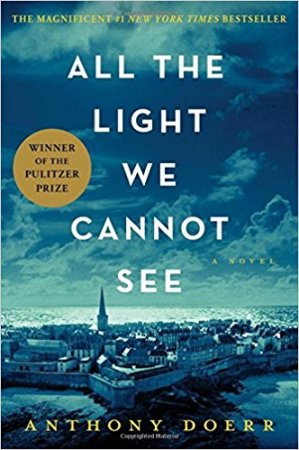 All the Light We Cannot See
All the Light We Cannot See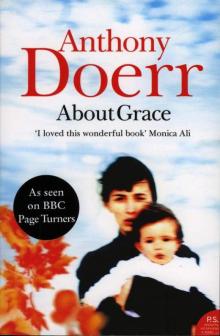 About Grace
About Grace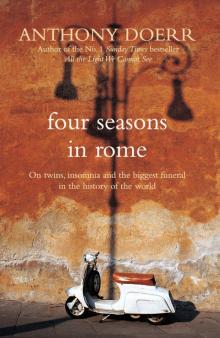 Four Seasons in Rome: On Twins, Insomnia, and the Biggest Funeral in the History of the World
Four Seasons in Rome: On Twins, Insomnia, and the Biggest Funeral in the History of the World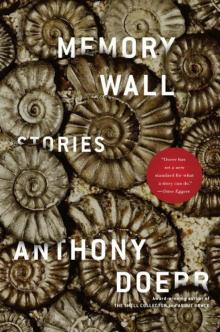 Memory Wall
Memory Wall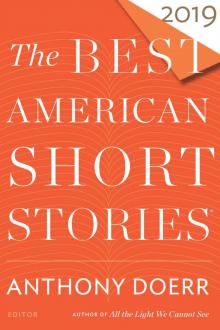 The Best American Short Stories 2019
The Best American Short Stories 2019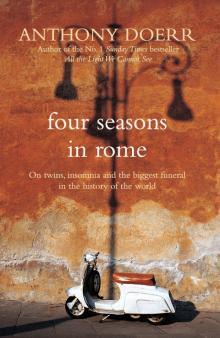 Four Seasons in Rome
Four Seasons in Rome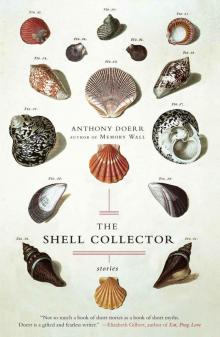 The Shell Collector
The Shell Collector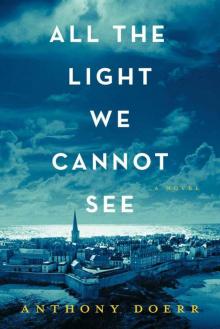 All the Light We Cannot See: A Novel
All the Light We Cannot See: A Novel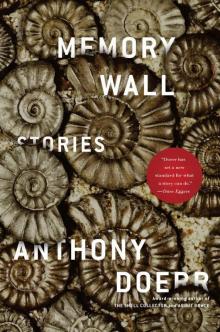 Memory Wall: Stories
Memory Wall: Stories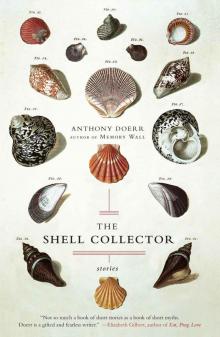 Shell Collector
Shell Collector